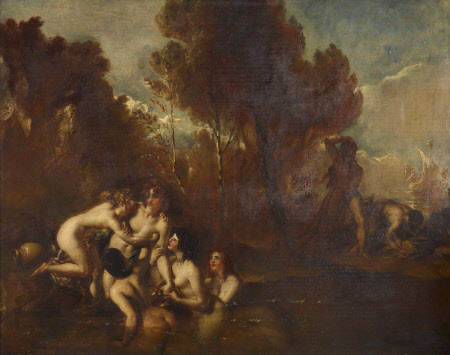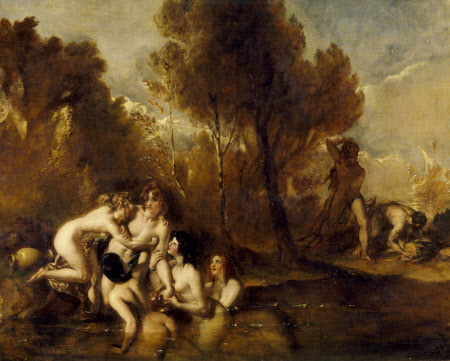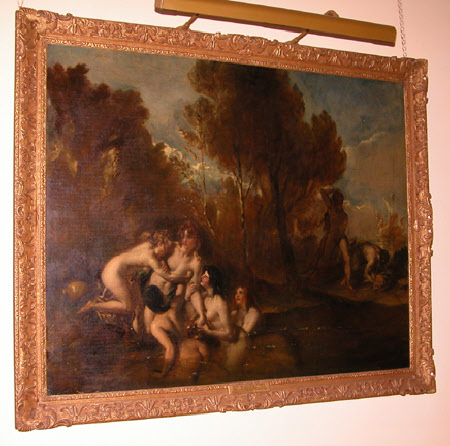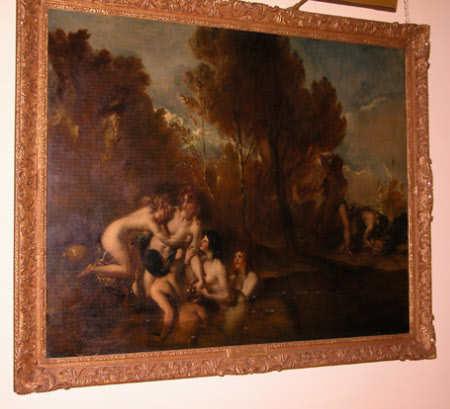Hylas and the Water Nymphs
William Etty RA (York 1787 – York 1849)
Category
Art / Oil paintings
Date
1833 (exh RA) - 1834 (exh at BI)
Materials
Oil on canvas
Measurements
883 x 1118 mm (34 ¾ x 44 in)
Place of origin
England
Order this imageCollection
Anglesey Abbey, Cambridgeshire
NT 515509
Caption
Hylas was the young son of Thiodamus, king of Dryopes, Hylas was the favourite of Hercules and accompanied him on the Argonautic expedition. When the ship put in at Mysia, Hylas went to a spring to bring fresh water to Hercules and Telamon. Spring nymphs were so taken with the youth, that they pulled him into water to remain with them forever. Hercules searched island, calling for Hylas. According to Theocritus, Hylas answered these calls three times, but sank before Hercules could find him. When Argos set sail at nightfall, Hercules remained to continue his search, but to no avail. Before returning to Argos, he established a cult of Hylas at Cius. Etty shows us the moment when Hylas, while fetching fresh water for the Argonautic expedition, is being carried away by Dryope and her water nymphs on account of his beauty. The painting was exhibited at the Royal Academy in 1833 to great acclaim. The group of Naiades surrounding the figures of Hylas recalls Etty’s Youth on the Prow and Ruben’s Water Nymphs from the Marie de Medici paintings.
Summary
Oil painting on canvas, Hylas and the Water Nymphs by William Etty RA (York 1787 – York 1849), 1833/34. In a pool at left, a group of nymphs/naiads are embracing Hylas and drawing him into the water. Hercules and attendant figure are on shore at right, a sailing ship on sea beyond. Figure of Hercules almost in monochrome. When the painting was exhibited by the artist at the Royal Academy in 1833 the following description (from a quotation from Lempriere’s translation Appollonius Rhodius), was attached: "The nymphs of the river, enamoured of the beautiful Hylas, carried him away, and Hercules, disconsolate at the loss of his favourite youth, filled the woods and montains with his complaints".
Provenance
Bought from artist for 160 gns. by Mr [J. Vincent] Sergeant Thompson at the British Institution Exhibition, 1834, (entry in Etty’s ‘cashbook’, 5 May 1834); sold at Christie’s, 5 March 1859, lot 62 and bought by H. Farrer for 400 gns (n.b. Graves has lot 57); H. Farrer sale at Christie’s, 15 May 1866, lot 103 bought by Fountain [sic]; Sir Andrew Fountaine sale, Christie’s, 7 July 1894, lot 3 and bought by Chester for 80 gns, called ‘Hylas stolen by Nymphs’); F. E. Sidney sale, Christie’s, 10 December 1937, lot 30, bought by Leggatt for 48 guineas; date of acquisition by Lord Fairhaven is unknown; bequeathed to the National Trust by Huttleston Rogers Broughton, 1st Lord Fairhaven (1896-1966) with the house and the rest of the contents.
Credit line
Anglesey Abbey, The Fairhaven Collection (National Trust)
Makers and roles
William Etty RA (York 1787 – York 1849), publisher
References
Gilchrist 1855 Alexander Gilchrist, Life of William Etty RA, 2 vols. 1855, vol. I, pp.359, 364; vol. II, pp.46, 337, p.102 Farr 1958 Dennis Farr, William Etty, London, 1958, pp.65-6, 76, 146, No. 64, Pl. 47a



